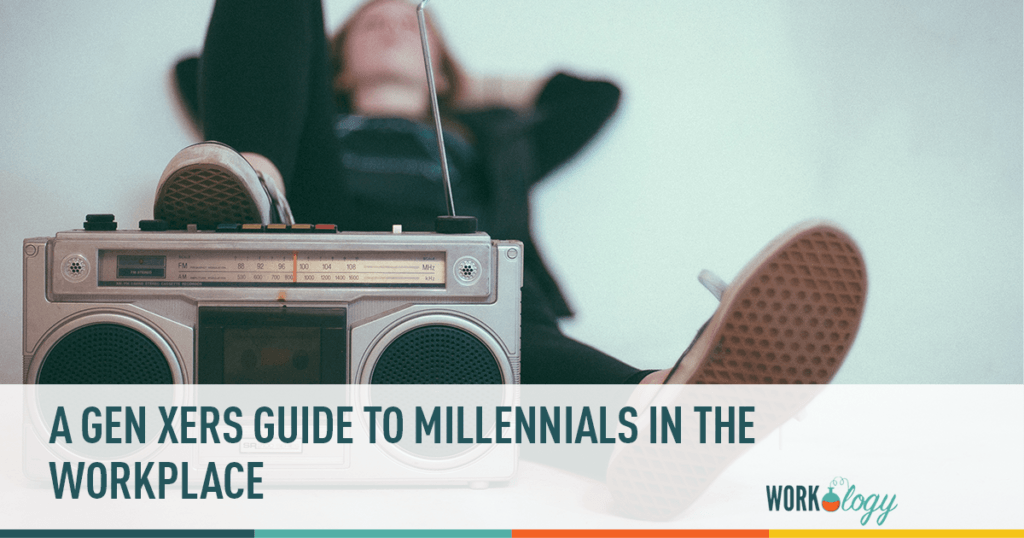Millennials are a hot topic right now. Whether it is how to attract them to your company, tips for onboarding them or thoughts on how this age group works, articles on millennials are all over the place. At the other end, we have the endless discussions about baby boomers and how many in that generation are putting off retirement. In all the hype and discussion, those of us in generation X have essentially become America’s forgotten middle child. What does it mean when we talk about generation X in the workplace?
A Gen Xers Guide to Millennials in the Workplace
Paging Generation X!
Generation X typically refers to people born from the early 1960s to the early 1980s. We grew up in a time before social media and YouTube, and we saw the rise of cell phones and watched as technology transformed the way we work. In the 1990s, the closest thing we had to blogging was watching Doogie Howser type in his computer diary at the end of each episode of his eponymous show. We are not digital natives, but many of us are comfortable adapting to new systems and technology in the workplace.
When I searched for “generation X” in a stock photo library for the image to go with this post, I ended up with a bunch of images of twentysomethings on their phones, taking selfies and hanging out. In a way, this is a good representation of what has happened to generation X. It seems we have been swallowed up between all the hype surrounding millennials and the discussions of issues facing baby boomers. We don’t even warrant a few stock photos.
This leads to the question, where is generation X? It seems that somewhere in the late 1990s we got buried under a pile of floppy disks and forgotten like an old mix tape full of pirated recordings from Pearl Jam concerts.
(Not) Talkin’ ‘bout my Generation
A 2010 Pew Research study found that only about half of the gen Xers polled thought their generation was unique. This is compared to about 60% of boomers and millennials who thought there was something unique about their generations. Among the gen Xers who thought their generation was unique, there was little consensus about what made them such.
Of course, the real question here is whether there is enough that is distinct about each generation to identify it by a single set of characteristics. When I read articles that refer to millennials as idealistic and entitled, I think back to how people said the same thing about generation X when we were in our twenties. Just as saving for retirement, job security and remaining competitive with a younger workforce have been concerns for baby boomers for a couple decades, those of us in generation X are starting to worry about the same things.
While there is some value in understanding the societal forces around people when they grew up, it seems that seeing different age groups as phases of the lifecycle may be a more accurate way to adjust the workplace to fit varying needs of each generation. After all, the millennials who are shaping tech today will be middle-aged people struggling with rapidly evolving tech in a few decades.
Societal Shifts, Change and the Evolving Workforce
Although I started off this post in search of generation X, I think it is important to end with a discussion about how we adapt to all workers, regardless of age. If we take this view that we are all passing through phases, the picture of a worker lifecycle starts to emerge. It is less important to focus on how we will adapt to a specific group and instead take a more holistic approach that accounts for the myriad ways of learning and working regardless of when someone was born.
After all, we are all affected by technological change and societal shifts in thinking. Millennials are not the only ones obsessed with their smart phones and posting on social media. The majority of the workforce is engaging in these activities. In addition, most of us have views on work that evolve and shift with the times.
Perhaps this is a marker of how I identify with my fellow gen Xers who do not see anything unique about our generation. Or maybe it is this perspective that has shaped my own view that much of the generation talk is not all that useful and, in fact, often can be divisive between different age groups. When we focus too heavily on differentiating age groups, we miss the fact that our movement through the lifecycle is actually a very similar path.










One Comment
As a fellow GenX-er, this really struck home. Thank you for sharing. It seems like you may have hit this before, but I suggest checking out the Strauss-Howe Generational Theory. The book can be a little dry. Also, sometimes things are so general that it makes it more “pop” theory than science. With that said, there are amazing nuggets of wisdom and truth within it. https://en.wikipedia.org/wiki/Strauss%E2%80%93Howe_generational_theory
Comments are closed.